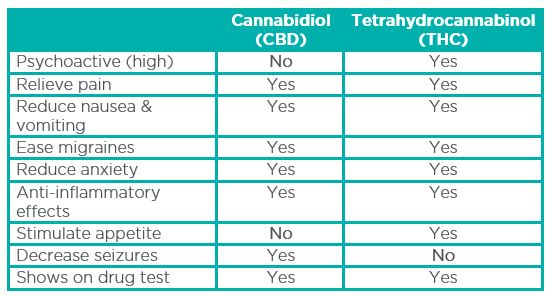Cannabis as a medical treatment is not as radical as you may think. Many medications have similar origins to cannabis. Aspirin, for example, was originally derived from the bark of a willow tree. Over time and as laws change, prescriptions for and the use of medical marijuana will be considered less radical too. You might be wondering what exactly medical marijuana is and how does it differ from recreational marijuana. Recreational marijuana is used without medical justification. Whereas, medical marijuana may be prescribed to patients who have one or more qualifying conditions.
In most cases, a patient has tried more traditional ways of relieving unpleasant symptoms of their chronic condition and has found them ineffective. The most common reason for using medical marijuana in the United States is for pain control. Medical Marijuana comes in multiple forms:
- Oral solution (ideal for patients who can’t swallow pills)
- Sublingual spray (a liquid put under the tongue)
- Vaporization oils (to be used in in an electronic cigarette)
- Oral capsules (to be swallowed just like any over-the-counter capsule)
- Topical formats (to be applied directly to a part of the body)

While there is a lack of research in medical marijuana, the vast majority of patients who are certified for and actively use it say their quality of life has improved. They report less pain, better appetite and less nausea. As you can imagine, even small improvements in persistent symptoms like these can make a big difference in a person’s life.
So, what are some frequently asked questions about medical marijuana?
What's the difference between THC and CBD?

The two Minnesota state-sanctioned medicinal cannabis manufacturers produce different formulations and combinations of these two compounds found in the cannabis plant. This chart shows key differences.
What medical conditions may qualify for medical marijuana prescriptions?
Currently, these are the qualifying conditions in Minnesota:
- Alzheimer’s and dementia
- Amyotrophic Lateral Sclerosis (ALS)
- Autism
- Cancer associated with severe/chronic pain, nausea or severe vomiting, or cachexia or severe wasting
- Glaucoma
- HIV/AIDS
- Inflammatory bowel disease, including Crohn’s disease
- Intractable pain
- Obstructive Sleep Apnea
- Post-Traumatic Stress Disorder
- Seizures, including those characteristic of epilepsy
- Severe and persistent muscle spasms, including those characteristic of Multiple Sclerosis
- Terminal illness, with a probable life expectancy of less than one year
- Tourette Syndrome
Will using medical marijuana impact my cognitive function?
It’s reasonable to expect attention, concentration, or memory impairment while under the influence of medical marijuana. Studies have shown the effect is limited to the time you are under the influence.
What are the risks of medical marijuana?
If cannabis is used as prescribed and intended, addiction is not an issue. However, cannabis can sedate you, so it’s important to find the right balance and most effective dosing for each person. While research is lacking, most physicians will scrutinize prescribing medical cannabis where potential risk exists to groups like: infants and children, pregnancy women, nursing mothers, and patients who a history of psychosis.
How much does medical marijuana cost?
Currently, insurance companies won’t cover medicinal cannabis. In Minnesota, there’s a $200 annual registration fee and patients can expect to spend from $100 to more than $1,000 each month, depending upon the type and amount purchased. But costs are coming down as more people participate in the program.
Who can prescribe medical marijuana?
Any licensed doctor, physician assistant, or advance practice registered nurse (nurse practitioner) must certify that patients have a qualifying condition for medical cannabis. There is currently no list of providers who are certifying these conditions. The provider must create an account and log in to certify a patient. In Minnesota, providers do not prescribe medical marijuana, they only certify that the patient has a condition that allows patients to purchase medical marijuana.
If you would like to learn more about whether your chronic condition symptoms might be reduced through the use of medical marijuana, talk to your healthcare provider for more details.
About Joseph Sicora, MD
Joseph Sicora, MD, is a family medicine physician at North Memorial Health, certified in geriatrics, hospice, and palliative medicine. Dr. Sicora has been certified to prescribe medicinal cannabis since it became legal in Minnesota in 2015. Typically, Dr. Sicora has 200 to 300 patients actively using medicinal cannabis. He also helps educate new physicians at the University of Minnesota Department of Family Practice and Community Health.

